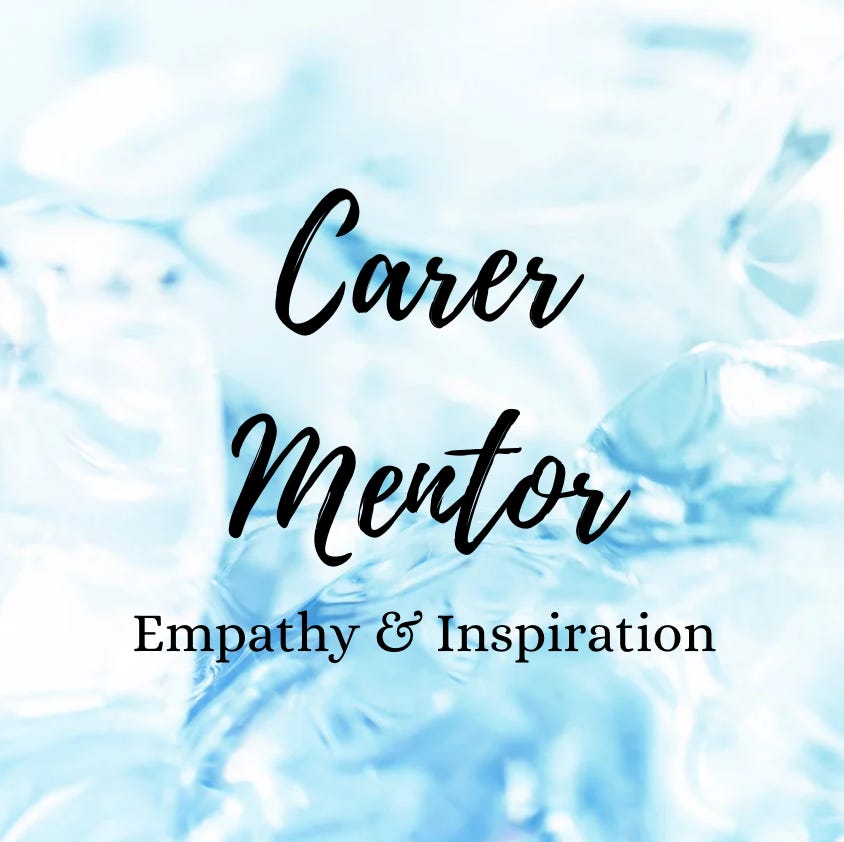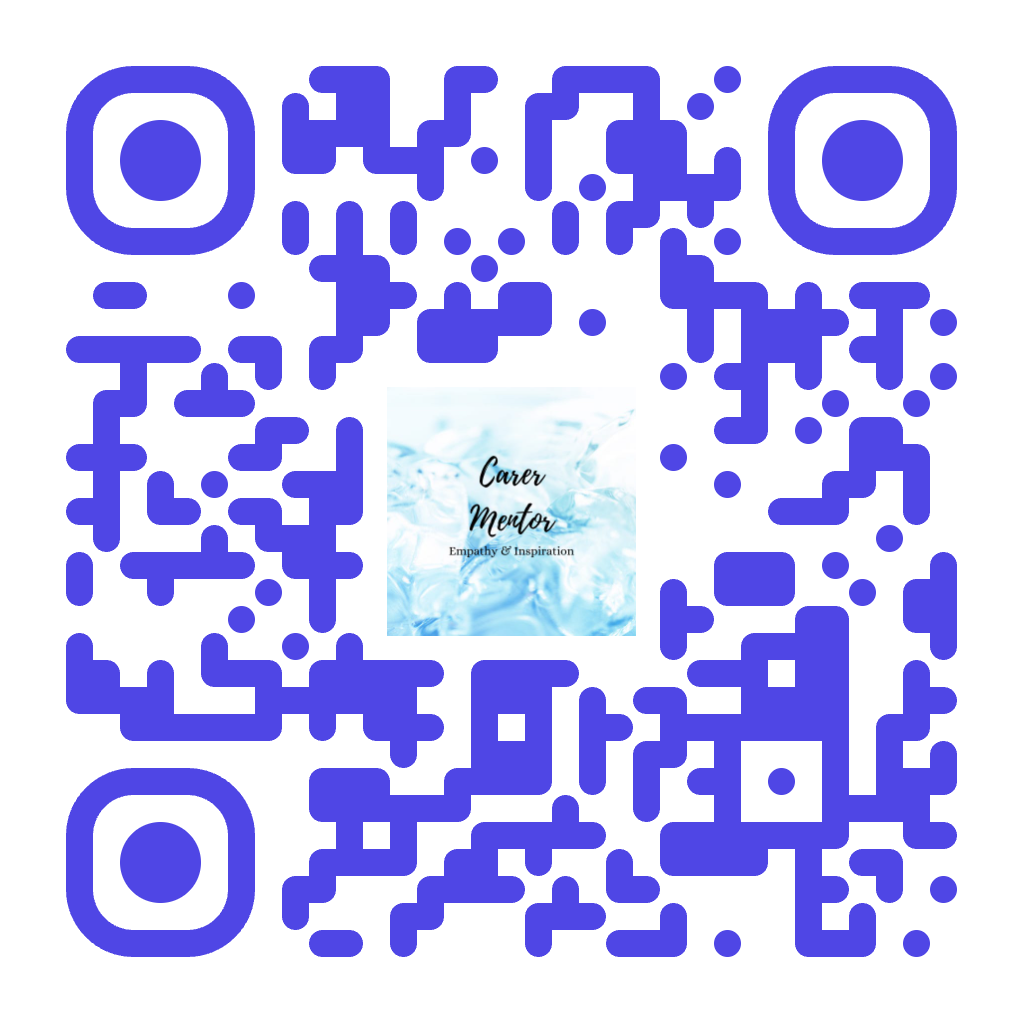Carer Mentor's August Roundup
Weaving threads of diverse experiences and insights to meet your needs.
Hello, Dear Readers and a warm ‘Welcome!’ to new readers. It’s great to have you with us. I can’t believe we’re approaching my birthday month!
You can read about me in Who Started Carer Mentor and Why?
The Carer Mentor August Roundup:
Articles that are joining the Website iCare Anthologies
Dementia. Highlighting an interview: Susan M Schultz with David Clegg of the Trebus Project
This Caregiver’s Continuous Learning:
August Carer Mentor Articles
Wearable Safety Devices: 'What will you do if you/your loved one has a fall?' Considerations, features and my experience.
Dementia Caregivers: 'How to connect and communicate more effectively.' Connection over correction. Amplifying the work of Dementia Action Alliance, Pat Snyder and Lynette Wilson. It’s full of practical tips and ideas that can help anyone who interacts with people who have dementia.
#9 This Caregiver's Watchlist: 'Giving Yourself Permission to...' Find a little lightness, a few giggles and inspiration from the comfort of your home.
Giving Receiving Care Anthology
In the sub-section Navigating Access to Care Support in the US I’ve recently added this article: What costs $209.50 per day and also is terrible? The answer is: coinsurance for skilled nursing when you have Medicare. by Lauren Klinger. Lauren breaks down the numbers and the real deal about navigating Medicaid and Medicare.
Index: Cancer Articles & Resources
Here are four recent additions to the iCARE: The Cancer Care Journey—a Reference Index of Insights.
Daniel Flora, MD, PharmD has shared an excellent article about What Does Remission Really Mean? A Plain-Language Guide to Cancer Terms Like NED, Stable Disease, and Response
Dr Tina Neel is the author of Surviving Cancer. I recommend reading these two articles:
This is something I’ve learned the hard way—both as a cancer survivor myself and as someone who has walked this road with others. When a person is facing the end of treatment options, they don’t need noise. They need dignity. And part of dignity is being heard without interruption, without correction, without our need to make them feel better.
Mel’s heart and spirit will capture you in the following article. Giving birth to new life force, reawakening, yet allowing herself to grieve. I appreciate her spirit and the skilful talent she has for articulating her experiences and feelings. I recommend digging into her articles and if you can support the fundraiser. Lung cancer 5 years on: roaring into life. Terror; surviving; thriving; acceptance and love, always love By Mel Erwin
Dementia Anthology HIGHLIGHT:
Interview with David Clegg of the Trebus Project by Susan M Schultz
In this interview published in EOAGH: A Journal of the Arts, David Clegg, the founder of The Trebus Project1, discusses how his artistic background led him to work with people with dementia. He explains his process of transcribing and editing conversations with individuals experiencing memory loss, treating their words as "sculptural" objects to reveal patterns and unique perspectives. The interview also touches on the challenges of presenting these stories to a broader audience through radio and stage readings, the resistance encountered from some care institutions, and Clegg's ongoing work to produce further collections of these powerful narratives.
I was drawn to David’s work, Battles Beyond the Battlefield, here on the Substack platform. As I delved deeper into his work, I began to appreciate the magnitude, depth, and impact of his work. “The Trebus Project is a collection of over 200 verbatim stories, based on interviews with people living in care homes.”
The interview with Susan Schultz sparked several lightbulb moments for me. I’d encourage you to read the full article.
The time and effort David has spent on the Trebus project are self-evident. It was fascinating to read about his process and the insights he uncovered during his experience. He revealed some Dementia language concepts I haven’t encountered elsewhere.
Here are a few excerpts from the interview. (David Clegg’s words that I’ve grouped under subheadings):
Words as objects:
“I was (and am) interested in artists such as John Cage, Bruce Nauman, Carl Andre, Le Monte Young, Alvin Lucier, Stan Brakage and Michael Snow, and other artists whose work seemed at times more like scientific research. I was obsessed, with Samuel Beckett and to a lesser extent the structural, cut up experiments of William S. Burroughs, B. S. Johnson and others. I was always very interested in words as objects, whether they were objects because they were recorded or printed or because they were conceptually defined units of information. What linked all these artists was an enquiry into time and their use of repetition.”
Architectural metaphors: prepositions, space and distance
“I put the stories together very slowly over months or even years, during which I might visit the person fifty times or more. Once I had a block of stories I began to see patterns. For example, there is a strange tendency for people to create architectural metaphors to explain their memory loss. They might say a thought is under the floor or behind the wall, suggesting that it is physically present but inaccessible. People often describe events that happened years before as recent but removed in terms of distance, “Mum, lives a hundred miles away now”. Many of the stories are peppered with references to moving up or down, usually up, so the past is usually described as “down”. Many of the storytellers have told me that their room is above or even on top of (in the sense of superimposed) on the family home from their childhood. As a sculptor, I find the notion of symbolic space endlessly fascinating.”
Patterns and shapes of language
“I’m interested in showing the pattern and shape of the language just as much as I am in showing the narrative content of a story. I was quite chuffed when I found out that Beckett referred to his later plays as objects.”
The loss of unique life-stories and personhood due to the homogenisation of information, to make care delivery easier.
“Homogenising the stories of people with dementia is a big issue for me. Some care homes use very narrow life story templates and lists of set questions, which funnel each person’s uniqueness into the same easy to manage shape, a general PWD. (Person With Disabilities)”
You'll be able to read the full article here or other experiences in the Dementia Anthology.
It’s inspiring to listen to Oral History narratives. Sasha Neal wrote Who Cares? Sharing life stories in care homes. The impact of an oral history project
We’d set out to show that people who live in care homes are just that – people, with personalities, histories and lives as complex and rich as anyone else’s – but there were personal changes for me, too. My experience of care homes up to this point had been shot through with grief and frustration and the constant wearying effort to advocate for appropriate care, and it was transformative to be able to see them as places which may not be perfect all the time, but where people could be understood, nurtured and supported.
These articles were the backdrop to reading ‘Contented Dementia1: A Revolutionary New Way of Treating Dementia: 24-hour Wraparound Care for Lifelong Well-being (Published August 6, 2009) by Oliver James. It was recommended by a couple of people in different Carer Forums, so I was excited to read it. Here are my thoughts:
This book is part memoir of Penelope Garner’s experiences. It also advocates for a care approach for Dementia sufferers, based on her experience. It seems like a straightforward, yet time-intensive approach. However, I believe it oversimplifies a complex, subjective and unpredictable situation that changes with time. More concerning, I felt the approach could set unrealistic expectations and additional burdens on caregivers. I’m curious to hear the opinions from anyone else who’s read the book or tried the SPECAL approach.
Chronic Illness and Disability
There were several occasions when we were caring for Dad, when ‘caresplainers’ tried to tell me what we ‘should’ be doing. ‘Why don’t you do xyz’ to make the most of your time together. They didn’t understand the challenges with accessibility; the stress and intensity of strategising needs, nor the implications for our care routine.
These articles by Debra and Jane brought those memories back. They share the realities, stressors and assumptions of travelling, or having a ‘day out in town’.
Debra Rafson introduces her publication with this article: What's Her Problem? Issue #1: People make assumptions about what chronic illness and disability “should” look like.
Jane Harrison, who publishes ‘Notes from an MS Lifer’, offers her perspective on accessibility, as someone with MS Dog Days Are Over? What I’m discovering about accessibility as I navigate the world with wheels.
Bereavement and Grief Anthology
I’ve just added Madeleine Alice’s piece to The Bereavement Grief Anthology. She’s gently embracing the numerous, overlooked forms of grief that need our compassion.
EverGrief: A Beginning. The who, what & why behind EverGrief.
Evergrief explores the many shapes of loss, especially the ones often unseen or unspoken. Written from the lens of navigating chronic illness, this is a place for naming, remembering, and making space for the slow work of disenfranchised grief.
This Caregiver’s Continuous Learning.
An Online Course Recommendation.
Monash University: Mindfulness for Wellbeing and Peak Performance. Teachers: Professor Craig Hassed, OAM, Dr Richard Chambers, Dr Sherelle Connaughton, Sahar Shakaib
I’ve just completed the four-week online course. I’m repeating this course for the third time as a refresher. This is the course that felt like a blessing when I found it in 2016, just after the spin cycle of the 2015 hospitalisation, 'A Prelude to Caregiving: Love and Torture.'
It’s a solid evidence-based introduction to Mindfulness with a mix of videos, guided meditations, references and an online discussion forum.
The course has been updated, but the lecturers are the same. The group discussions are just as helpful as the lessons themselves, as we each put the insights into action and learn from each other.
For anyone unfamiliar with Mindfulness, I consider this the best introduction I’ve found to date. For anyone familiar with Mindfulness practice, you may enjoy sharpening your focus again. As an online course, anyone can participate from any location.
A Book Recommendation
Alongside the four week Monash University course, I’ve been re-reading, ‘No Mud, No Lotus.’ It was a perfect pairing. In ‘No Mud, No Lotus’, Chapter 1, ‘The Art of Transforming Suffering’ Thich Nhat Hanh shares
If we focus exclusively on pursuing happiness, we may regard suffering as something to be ignored or resisted. We think of it as something that gets in the way of happiness. But the art of happiness is also and at the same time the art of knowing how to suffer well. If we know how to use our suffering, we can transform it and suffer much less. Knowing how to suffer well is essential to realizing true happiness.
Have you read, ‘No Mud, No Lotus’?
The Carer Mentor Website and Newsletter
The last week of every month you’ll receive a Carer Mentor Roundup via email, to ensure you’ve not missed any of my articles or additions to the iCARE Anthologies
The Carer Mentor Website (desktop version) is our main hub, and I hope you’ll use it as a dynamic reference and also a portal to connect with other subscribers/publications within our community support network.
The desktop web version is the best way to experience all the resources, tools, anthologies and connect to other readers via the directories.
You can also keep up to date with new articles via the app2 if you scan the QR code:
As the website moves towards its second year on this platform, I’m evolving its structure, content and delivery. There are many colourful threads in its tapestry. The design is still evolving.
The Warp and Weft of Carer Mentor today
The Warp/Structure:
The Main Frame: iCARE Stack, Memoir (milestones in my journey), ComfortZone, The CAPE are the main lines that hold the design and frame.
The smaller bones of the frame: the indexes and anthologies within iCARE Stack and Support resources
The Weft/The filling
Between the warp and weft is a breathing space to explore whichever way you wish. The website content is all free and interlinked.
The weft is composed of my articles and those I discover through my research.
I weave the articles into indexes and anthologies for anyone to access at anytime.
Carer Mentor is designed to be a dynamic, evolving hub and portal to others, to network a community of support.
The diverse insights, resources and ideas offer the colour and potential reframes that you may not be aware that you need; empathy and inspiration.
Please ‘❤️’ LIKE the article to guide others here.
Carer Mentor by Victoria is free to read. If you have the means and would like to support the publication, I welcome monthly (£6) and annual (£50) subscriptions. Thank you for your ongoing support.
Tell Mrs Mill her Husband is still Dead: Stories from the Trebus Project. David Clegg (Author), Andrea Capstick (Editor), Colette Bryce (Editor), Sarah Hesketh (Editor), David Greenberger (Editor)
For more than 10 years the Trebus Project has been working to capture the memories and insights of people with dementia before their words are lost to history. So far more than more than two hundred ‘stories’ have been pieced together ranging from a few stumbling lines to more than thirty exuberant pages. This is the second of two compilations self published by the project. It contains 47 life stories assembled from the fragmented memories of people with Alzheimer’s disease and dementia in nursing homes and locked hospital wards across the country. The stories range from first hand accounts of important historical events such as the London Blitz and the Suez crisis to personal tales of counterfeit money, murder, stolen biscuits and getting drunk with Princess Margaret. Several of the stories communicate the struggle of living with dementia in episodes containing the contributor’s last spoken words. The editors aim was to give voice to a group of people who are not only marginalised, but are also often perceived as having nothing left to say. They hope to have demonstrated that everyone has a story to tell, even if it can be sometimes fragmented or difficult to interpret; all people need is for someone to truly listen.
The Carer Mentor publication is housed on the Substack Platform that has an app: https://substack.com/app you can click the link to download the app, and read more about it.





Thank you for including "What's Her Problem?" in this wonderful collection of resources, Victoria!
Great roundup as always - thanks Victoria!
Quite randomly, I recognized the name of the writer of one of the articles you included as someone who used to work in the department I managed at a non-profit social service organization. What a small world!